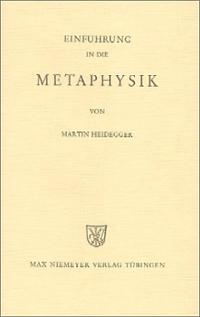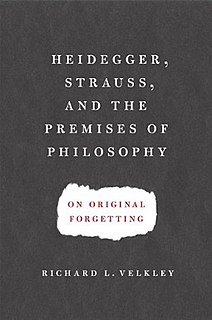Related Research Articles

Thought encompasses an "aim-oriented flow of ideas and associations that can lead to a reality-oriented conclusion". Although thinking is an activity of an existential value for humans, there is still no consensus as to how it is adequately defined or understood.

Martin Heidegger was a German philosopher who is widely regarded as one of the most important philosophers of the 20th century. He is best known for contributions to phenomenology, hermeneutics, and existentialism.

Hermeneutics is the theory and methodology of interpretation, especially the interpretation of biblical texts, wisdom literature, and philosophical texts. Hermeneutics is more than interpretive principles or methods used when immediate comprehension fails and includes the art of understanding and communication.

Hannah Arendt was a German-born American political theorist. Her many books and articles have had a lasting influence on political theory and philosophy. Arendt is widely considered one of the most important political thinkers of the 20th century.
Hans Jonas was a German-born American Jewish philosopher, from 1955 to 1976 the Alvin Johnson Professor of Philosophy at the New School for Social Research in New York City.

Being and Time is the 1927 magnum opus of German philosopher Martin Heidegger and a key document of existentialism. Being and Time had a notable impact on subsequent philosophy, literary theory and many other fields. Though controversial, its stature in intellectual history has been favorably compared with several works by Kant and Hegel. Heidegger maintains that philosophers have misunderstood the concept of Being since Plato, misapplying it solely in the analysis of particular beings. The book attempts to revive ontology through an analysis of Dasein, or "being-in-the-world." It's also noted for an array of neologisms and complex language, as well as an extended treatment of "authenticity" as a means to grasp and confront the unique and finite possibilities of the individual.
William McNeill is Professor of Philosophy at DePaul University.

Contributions to Philosophy is a work by German philosopher Martin Heidegger. It was first translated into English by Parvis Emad and Kenneth Maly and published by Indiana University Press in 1999 as Contributions to Philosophy . In 2012, a new translation was done by Richard Rojcewicz and Daniela Vallega-Neu and published by Indiana University Press as Contributions to Philosophy . Composed privately between 1936 and 1938, but not available to the public until it was published in Germany in 1989, the work is thought to reflect "the turn" in Heidegger's thought after Being and Time (1927).
David Farrell Krell, is an American philosopher. He is professor emeritus of philosophy at DePaul University. He received his Ph.D. in philosophy at Duquesne University, where he wrote his dissertation on Heidegger and Nietzsche. He has taught at many universities in Germany, France, and England. Specializing in Continental Philosophy, he has written many books on Heidegger and Nietzsche, including Daimon Life: Heidegger and Life Philosophy (1992), Intimations of Mortality: Time, Truth, and Finitude in Heidegger's Thinking of Being (1986), The Good European: Nietzsche's Work Sites in Word and Image (1997), and Infectious Nietzsche (1996). Additionally, Krell has written extensively about German Idealism, his books in this area include The Tragic Absolute: German Idealism and the Languishing of God (2005), and Contagion: Sexuality, Disease, and Death in German Idealism and Romanticism. Krell has also translated Heidegger's lectures on Nietzsche, and was the editor of Heidegger's Basic Writings (1977). In a 2005 interview, Krell cited Jacques Derrida as a major influence on his work on Nietzsche.
Christian Lotz is a German-American philosopher currently teaching at Michigan State University. Lotz's work primarily focuses on 19th and 20th Century European philosophy, continental aesthetics, critical theory, Marxism, and contemporary European political philosophy.

Introduction to Metaphysics is a revised and edited 1935 lecture course by Martin Heidegger first published in 1953. Heidegger suggested the work relates to the unwritten "second half" of his 1927 magnum opus Being and Time. The work is also notable for a discussion of the Presocratics and for illustrating Heidegger's supposed "Kehre," or turn in thought beginning in the 1930s—as well as for its mention of the "inner greatness" of Nazism.
Peter Eli Gordon is an American intellectual historian. The Amabel B. James Professor of History at Harvard University, Gordon focuses on continental philosophy and modern German and French thought, with particular emphasis on the philosopher Martin Heidegger, continental philosophy during the interwar crisis, and most recently, secularization and social thought in the twentieth century.
The following is a bibliography of John D. Caputo's works. Caputo is an American philosopher closely associated with postmodern Christianity.
The Cassirer–Heidegger debate is an encounter between the philosophers Martin Heidegger and Ernst Cassirer in March 1929 during the Second Davos Hochschulkurs which held its opening session in the Hotel Belvédère in Davos on March 17, 1929. The debate was about the significance of Kantian notions of freedom and rationality.
Richard L. Velkley is an American philosopher and Celia Scott Weatherhead Distinguished Professor of Philosophy at Tulane University. Velkley is known for his expertise on Kant, Rousseau, and post-Kantian philosophy. He is a former associate editor of The Review of Metaphysics (1997-2006) and a former president of the Metaphysical Society of America (2017–18).
Alejandro Arturo Vallega Arredondo is a Chilean-born philosopher, decolonial thinker, writer, painter, and Professor of philosophy at the University of Oregon. In his work he develops an aesthetic philosophy, in which he engages the aesthetic or pre-reflexive affective, embodied and memorial dimensions of philosophical understanding. In the recent years he has emphasized this approach to philosophical understanding in Philosophy of Liberation and decolonial thought. Vallega has been co-director of the Collegium Phänomenologicum twice and is active member of the director's board. He served in the past as president of North American Society for Philosophical Hermeneutics. Among his editorial activities, he is the editor of the English version of Enrique Dussel's Ethics of Liberation, and he is editor of the World Philosophies Series, published by Indiana University Press. In the last years he has developed a body of art works under the theme of "elemental painting."

Heidegger, Strauss, and the Premises of Philosophy: On Original Forgetting is a book by Richard Velkley, in which the author examines the philosophical relationship between Martin Heidegger and Leo Strauss. It has been translated into French and Chinese.
Frank Schalow is an American philosopher. He is known for his exegesis of Martin Heidegger's writings. He is a co-editor of, the journal Heidegger Studies and a professor of the University of New Orleans.
Sean Joseph McGrath is a Canadian philosopher and Professor of Philosophy at Memorial University of Newfoundland. He is known for his works on Friedrich Schelling and Heidegger's philosophy. McGrath is the editor of Analecta Hermeneutica and a member of the College of New Scholars, Artists and Scientists of the Royal Society of Canada.
Miguel de Beistegui is a continental philosopher and Professor of Philosophy at the University of Warwick. He is known for his expertise on Heidegger's thought.
References
- ↑ Powell, Jeffrey (1 January 2008). "The Bodily Dimension in Thinking". Research in Phenomenology. 38 (3): 427–436. doi:10.1163/156916408X336774. ISSN 1569-1640 . Retrieved 30 December 2018.
- ↑ Polt, Richard (17 July 2012). "Review of Contributions to Philosophy (Of the Event)". Notre Dame Philosophical Reviews. ISSN 1538-1617 . Retrieved 30 December 2018.
- ↑ Bernstein, Jeffrey A. (21 April 2015). "Thoughts on the Two Translations of Heidegger's Beiträge". Comparative and Continental Philosophy. 4 (2): 295–306. doi:10.1179/ccp.4.2.3449071550861416. S2CID 170303034.